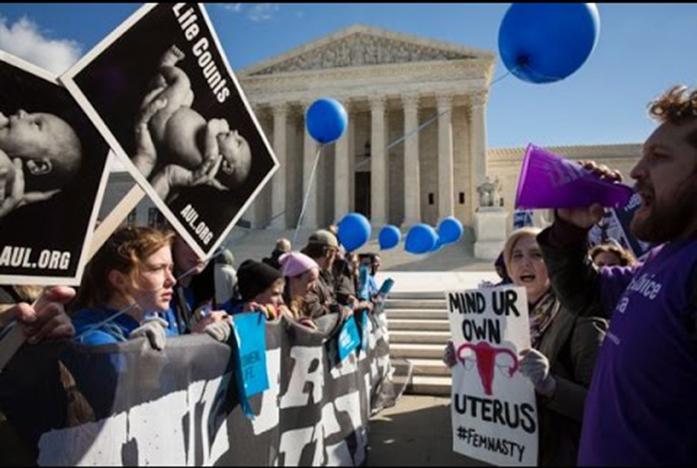By Naomi Hofferber
Students for Life of America, a nationwide anti-abortion organization, hosted a screening of the film Hush in the IMU on Thursday night that explored alleged abortion risks.
“The organization advocates for the protection of all life, from the point of conception to natural death,” said Daniel Larkin, the president of the Students for Life at Iowa. “We support young pregnant mothers in the community who need our help, and we do a lot of activism, raising awareness about the issue of abortion and helping out mothers in need.”
The film examined matters of mental health, risks, and cancer issues reportedly related to abortion. Pro-choice protesters held a sit-in to fill seats and handed papers with a list of information counter to the film.
“It’s fairly neutral in nature,” Larkin said. “It’s potentially lifesaving information; we already know that abortion takes the life of an innocent human being, but now that there is mounting evidence that women who have abortions have an increased risk of certain types of cancers. That’s something that we think individuals, especially college-age women who are at a higher likelihood of obtaining an abortion; that’s information that they should know about before making a decision.”
Currently, the topic of abortion related to increased risks of breast cancer is still debated, though the three largest studies on the matter (Denmark, Harvard, and California) found no link. Because testing this as an experiment would be unethical and impractical, scientists rely on various types of studies.
The American Cancer Society website states that the largest and potentially most reliable study was done in Denmark, in which 1.5 million women were studied in the 1990s. The study did not rely on recall, eliminating bias. Adjusting for known breast-cancer risk factors, the researchers found that induced abortion had no overall risk on breast cancer.
Numerous cohort studies have found abortions have no effect on breast-cancer risk; however some retroactive case-control studies show women to have increased risk of breast cancer, around 11 percent.
The film contended that women who had abortions had a 30 to 40 percent increase chance of getting breast cancer later in life.
However, the Centers for Disease Control and Prevention does not list abortion as a risk factor for breast cancer, and the American Congress of Obstetricians and Gynecologists also found no causal relationship between breast cancer and induced abortion.
The film also cites mental illness being a factor after abortion, and a few women in the film shared their personal stories of mental illness post-abortion.
The American Psychological Association’s Task Force on Mental Health and Abortion found no evidence that a single abortion causes mental-health problems, but some women do experience grief, sadness, or loss following an abortion.
An abortion advocate and volunteer for the Emma Goldman clinic, who wished to remain anonymous because of safety issues, disputed the film.
“We have a legal document for them to sign stating the risks,” they said. “There is no risk to an abortion above 3 percent. And that’s 3 percent nationally for vacuum aspiration.”
“The biggest thing is that it’s a greek-life educational credit, so they’re going in thinking that it’s going to enlighten them, and they’re going to learn stuff because it’s an objective thing, but it’s not,” sit-in protester Amanda Bartlett said. “Everybody got an email from Students for Life at Iowa … they end with ‘one way or another, someone is lying to women,’ and how in pro-life circles, hearing about the negative impacts of abortion is a common thing, when there is little to no evidence that abortion has an impact [on health issues].”
Jordan Mitchell, a member of greek life, attended the event for an out-of-house educational requirement to learn more about abortion.
“I thought the film was good at informing people in general about overall, some of the health implications of abortions,” Mitchell said. “I think there was a nonbiased opinion of it, and I felt overall it was just a good film. It didn’t say abortion was bad, it just gave the facts, I think.”
The organizer of the protest, who wished to remain anonymous, said the problem is the documentary presents information in a one-sided method that claims to be neutral. In the film, only two individuals spoke to the safety of abortions. They also discussed the danger of presenting false information to individuals.
“If you think abortion is morally wrong because that’s your religion, that’s fine, that’s your opinion, but you can’t try to control other people’s lives and persuade them to do something through misinformation,” the organizer said.







